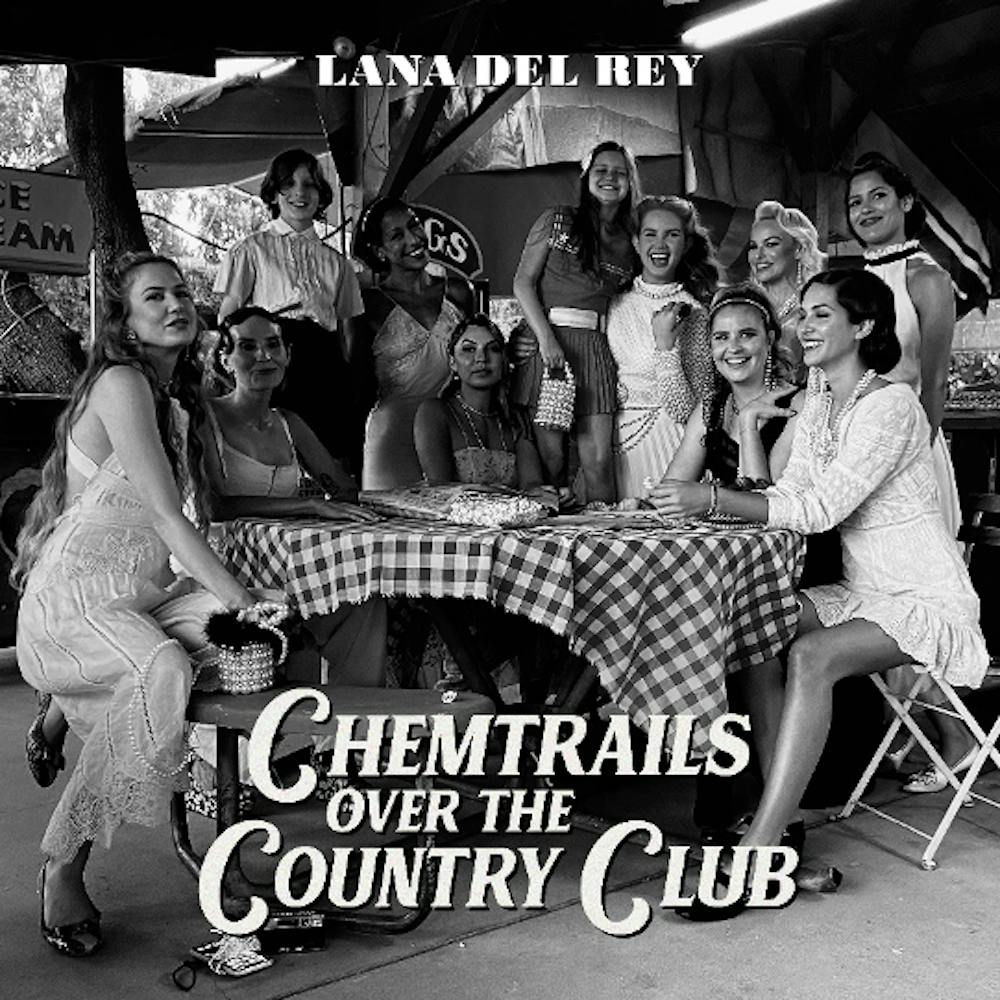Artist: Lana Del Rey
Album: Chemtrails Over The Country Club
Label: Interscope Records & Polydor Records
Release Date: March 19
Rating: 8/10
In 2019, Lana Del Rey solidified herself as one of the great American singer-songwriters with her critically acclaimed album, “Norman F---ing Rockwell.” Now, after a year of controversies, Del Rey has reasserted her music prowess and public presence with “Chemtrails Over The Country Club.”
“Chemtrails Over The Country Club” is many things — a love letter to American music tradition, a reflection on Del Rey’s fame and a profoundly intimate album largely inspired by Del Rey’s “stunning girlfriends” and “beautiful siblings,” according to Interview Magazine.
The album opens with “White Dress,” a five-minute reflection on Del Rey’s innocence prior to her fame. Del Rey’s whisper and light tone creates an intense intimacy that carries on throughout the album, emphasizing this project’s personal character and the enthralling atmosphere of her work.
“White Dress” also begins the album’s journey across the U.S., one primarily rooted in the Midwest and at a dissonance with her current life in California. “White Dress” sets Del Rey in Florida, the state where she developed her stage name.
As “White Dress” transitions into the title track of “Chemtrails Over The Country Club,” Del Rey moves out of adolescence and into an age marked by romance and self-discovery.
In the first verse Del Rey sings, “Well, I don’t care what they think / Drag racing my little red sports car / I’m not unhinged or unhappy, I’m just wild.” This sentiment — living an authentic life — speaks to the soft confidence Del Rey continues to assert throughout the album, including in the fifth track, “Wild at Heart,” in which Del Rey continues, “If you love me, you’ll love me / ‘Cause I’m wild, wild at heart / If they love me, they’ll love me / ‘Cause I’m wild, wild at heart.”
Del Rey is unapologetically herself and is unwilling to compromise for others’ approval.
The titular track, coupled with its Jan. 11 music video, also evokes the nostalgia felt in “White Dress.” However, this is not a nostalgia for Del Rey’s own youth, but of the aesthetics of retro America, which reinforces this album as both an expression of Del Rey’s personal life and her connection to American tradition.
Del Rey continues her journey into maturity with the third track, “Tulsa Jesus Freak,” a song oversaturated in auto-tune as opposed to the bracing raw rasp found in “White Dress.” Here, Del Rey resides heavily on religious imagery and culture found largely in America’s midwest to depict the relationship between her and her significant other, Clayton Johnson.
In track eight, “Yosemite,” Del Rey continues her exploration of self and Middle America. This is the folkiest of all the songs on “Chemtrails Over the Country Club,” as it evokes imagery of the Midwest, juxtaposed against the backdrop of the California national park.
The blend of Del Rey’s melancholic low notes and hauntingly beautiful high notes makes “Yosemite” the perfect mixture of past and present, understanding and sadness and the various American cultures.
But Del Rey does not just recall American music tradition through genre alone, as “Yosemite” suggests.
Throughout the album, Del Rey carries the motif of Elton John’s “Candle in the Wind” and consistently namedrops other American singer-songwriters of great fame and acclaim.
In her penultimate track, “Dance Till We Die,” Del Rey opens with the lines “I’m coverin’ Joni and I’m dancin’ with Joan / Stevie is callin’ on the telephone.” Here, Del Rey pays homage to music industry greats Joni Mitchell, Joan Baez and Stevie Nicks.
Del Rey ends “Chemtrails Over The Country Club” with a cover of Joni Mitchell’s “For Free,” which features Weyes Blood and Zella Day.
This closing track is a perfect culmination of the album’s assertion that Del Rey’s personal voice is reviving American music tradition for the greater modern audience. It finalizes the reflective tone of “Chemtrails Over The Country Club,” without demanding Del Rey’s work be overwhelmed by the past.
Del Rey is moving forward in her work, but she cannot do so without a healthy foundation.
Overall, “Chemtrails Over The Country Club” maintains Del Rey’s reign over Americana — blending traditional sounds of folk music, blues and soft rock into a mature and entirely captivating auditory experience for the modern audience.
The album is Del Rey at her most vulnerable and her most “Lana.” It carries with it the familiar style of the singer without feeling stale or repetitive. It is an ode to both herself and to the traditions that have brought her to fame with songs that weave seamlessly together from beginning to end.
The arts desk can be reached at arts@ubspectrum.com

Kara Anderson is a senior arts editor at The Spectrum. She is an English and Spanish double major and is pursuing a certificate in creative writing. She enjoys baking chocolate chip cookies, procrastinating with solitaire and binging reality TV on the weekends.





